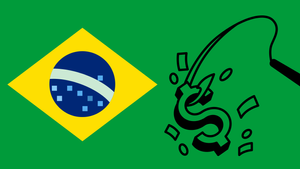The IFPI has welcomed the latest efforts by authorities in Brazil to crackdown on stream manipulation. Cyber Gaeco, a cybercrime unit within the prosecutor’s office of Sao Paulo, has secured a web-blocking order from the country’s courts targeting JustAnotherPanel, a global social media marketing platform that allows people to pay to boost likes, followers and streams.
Alongside those services, says IFPI, JustAnotherPanel also “provides technical infrastructure to a large network of re-seller sites offering fake streams on digital streaming platforms, as well other inauthentic interactions such as fake likes and followers”.
Victoria Oakley, CEO of global record industry trade group IFPI, says, “Fake streams aren’t just a numbers game - they harm artists and erode trust in our system”. By seeking to block services like JustAnotherPanel, she adds, the Brazilian authorities “reinforce the value of authenticity in music and ensure that Brazilian artists and music creators can continue to create new music”.
The record industry and law enforcement in Brazil have been particularly proactive in cracking down on streaming fraud, including going after the platforms that allow people to artificially boost the streams of specific tracks and videos. Past legal action resulted in some platforms removing their stream manipulation products entirely.
However, just as with the battle against music piracy, tackling stream manipulation requires a multi-layered, multi-country approach, with service providers able to base themselves in jurisdictions where legal action is harder to pursue.
CMU’s own research shows that - based on the IP address in use by the site - JustAnotherPanel appears to be operating on servers provided by a Russian company operating out of Dubai with an IP address in the Netherlands.
Web-blocking orders - where internet service providers are ordered to block people from accessing certain websites - offer only limited scope for restricting use of a globally available service like JustAnotherPanel. Geoblocking is easily circumvented by using a VPN or alternative DNS resolver, which has resulted in rightsholders trying to get web-blocking orders against those services too.
Another approach for tackling stream manipulation is to pressure search engines and payment providers to cut off the rogue players, so it’s harder for them to promote their services and take payments.
On JustAnotherPanel’s website, the platform says that it accepts payment via payment platform Payeer, cryptocurrency and credit or debit cards, with the credit/debit card payment link resolving to bobsal.gateway.mastercard.com - apparently a payment gateway integrating directly with Mastercard.
Nevertheless, Cyber Gaeco reckons that its action against JustAnotherPanel has considerably disrupted the platform’s illegal operations.
The web-blocking order secured by the cybercrime unit has disrupted “at least 43 illegal local services” and “over 1131 foreign re-sellers”. Its investigation also “discovered the extensive botnet system that formed part of JustAnotherPanel infrastructure to deliver inauthentic behaviour online”.
That said, as of this afternoon, JustAnotherPanel was still offering a wide range of services, including Spotify Premium plays on a range of devices - including iOS, Android, MacOS, Windows, Apple TV, Carplay and Consoles - at prices ranging from $1.1025 to $1.155 per thousand.
Other options include geotargeted Spotify Premium plays in the US, Netherlands, France, Germany, Spain and Portugal for $0.892 to $1.365 per thousand, and ‘lifetime guaranteed’ Apple Music premium plays for $6.2375 per thousand.
Despite efforts to crackdown on stream manipulation, platforms like JustAnotherPanel continue to grow their user-bases, and not just from artists and labels trying to boost their own stats and streaming income.
Another major challenge caused by the stream boosting services is the impact of people targeting competitors with fraudulent streams - paying to boost other people’s tracks in the hope it will harm them now that Spotify and other streaming services are instituting fines, and blacklisting and taking other action against tracks or artists suspected of artificially boosting streams.
There are an increasing number of reports from artists who have not engaged in any stream manipulation who are finding their tracks are subject to penalties or removal, with some suspecting that they are being targeted by competitors or bad actors with a grudge against them.
With the wide availability of these sorts of boosting services, and the often long drawn out appeal processes at the streaming services if tracks or artists are penalised, malicious targeting can have significant impacts for artists.
All of which makes the ongoing efforts to crackdown on stream manipulation - however minor the impact each action might have - really important. The latest legal action against JustAnotherPanel has also been welcomed by Brazilian record industry trade group Pro-Música Brasil.
Its President Paulo Rosa says, “stream manipulation is one of the biggest concerns of the music sector these days. We applaud the public attorney’s office of the state of Sao Paulo for this successful operation and will continue to work closely with Brazilian authorities to tackle these fraudulent practices and protect music consumers”.

